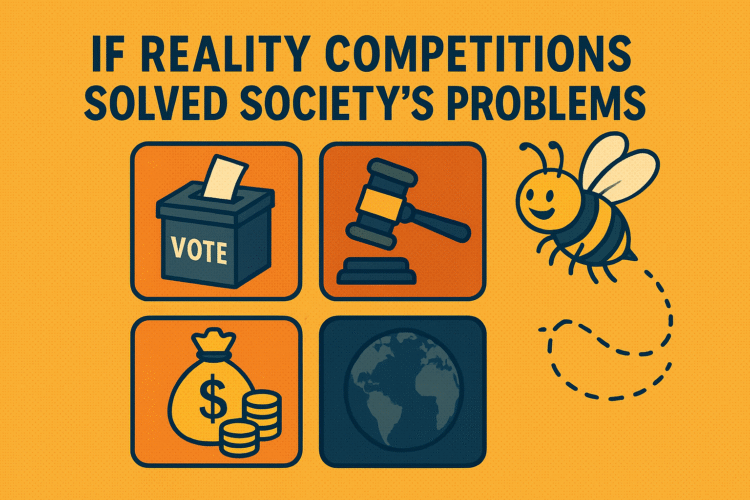
Imagine a world where Congress is replaced by contestants in sequins, Supreme Court rulings come down to who gets the final rose, and infrastructure funding is determined by who can survive the most eliminations on a beach with zero electricity and twelve influencers. If this sounds absurd, ask yourself: is it really any worse than what we’re already doing? Because let’s face it—at this point, solving the nation’s biggest problems through reality competition shows might be our last, best hope.
Take healthcare, for example. What if instead of debating it endlessly in committee meetings funded by pharmaceutical lobbyists, we just aired So You Think You Can Survive Without Insurance? Picture it: uninsured Americans competing in medical-themed obstacle courses. Win the suture relay and you get your insulin covered. Lose a round, and you’re sent home with only a WebMD printout and a pack of ice. The ratings would be incredible, the co-pays minimal, and finally, we’d have a system where outcomes depend on merit—well, athleticism and a knack for dramatic confessionals, but close enough.
Then there’s climate change. Forget policy frameworks or carbon credits—let’s green the planet the old-fashioned way: televised shame. Enter The Amazing Shrace, where teams race across the country reducing their carbon footprints. Bonus points for upcycling their wardrobe, planting trees in hostile terrain, and making kombucha that doesn’t taste like regret. The team that offsets the most emissions wins the grand prize: clean air and a reusable tote bag full of moral superiority.
Gun reform could easily be handled by Survivor: Second Amendment Island. Drop a dozen lawmakers on a deserted island armed with the exact policies they claim work best. One group has background checks and regulations. The other has open carry and no questions asked. Let’s check back in 30 days and see who’s still standing. Spoiler: it’s not going to be the guy insisting the best way to stop a coconut is with a semi-automatic.
Even education reform could benefit from a little competition flair. Are You Smarter Than a Former Secretary of Education? pits public school teachers against the people who’ve actively worked to underfund them. Contestants answer basic questions about U.S. history, science, and how to write a coherent sentence—things that would’ve disqualified half of our cabinet in a normal country. If teachers win, they get actual supplies for their classrooms. If the former secretary wins, well, we all lose and she gets a yacht she can’t pronounce.
Immigration policy? Please. The Border’s Got Talent! Each week, immigrants from around the world showcase their skills, work ethic, and fluency in memes to a panel of judges who are replaced weekly to reflect America’s ever-changing opinions. Golden buzzers for DACA recipients, green cards for essential workers, and deportation only for the people trying to marry their cousins on TLC. Imagine the empathy that might follow if we actually had to see these families compete, cry, and triumph instead of turning them into stats on a teleprompter.
And what about income inequality? Millionaire Swap could feature billionaires living on $7.25 an hour for a week. They’d flip burgers, work double shifts, and try to pay rent with a smile and two expired coupons. Meanwhile, the minimum wage worker gets a week in their mansion and access to a functional healthcare plan. The moment a tech CEO complains that the bus is late or that their barista spelled “Elon” wrong, we revoke one of their tax breaks.
The judicial system? Please welcome Dancing With the Sentences. Defendants choreograph their appeal arguments while judges score them based on creativity, legal accuracy, and how well they can pirouette through systemic injustice. Surprise twist: private prisons get voted off the island in week two.
Of course, we can’t forget foreign policy. Introducing Diplomacy Drag Race, where international leaders must solve global crises while strutting down the runway dressed as symbols of their country’s history, corruption, or cultural guilt. Miss Germany serves reparations realness, while Miss America lip-syncs for her democracy. In the final episode, countries solve conflicts not with bombs, but with ballroom categories like “Arms Control Eleganza” and “Sanctions but Make It Fashion.”
Even voting rights could be sexier. The Masked Voter allows people to vote anonymously on issues—no gerrymandering, no intimidation, just elaborate costumes and cryptic clues about where they stand on school funding. “Could this be a blue-leaning teacher from Wisconsin, or is it actually Mitch McConnell in a raccoon suit trying to suppress early voting? Stay tuned!”
And if we really wanted to get honest about America’s relationship with race, class, and justice, we could just create Big Brother: White House Edition. Lock twelve politicians inside a house filled with cameras and make them live on the minimum benefits they’ve approved for others. Confessional booths become truth booths. Evictions happen when someone actually admits the system is rigged. Winner gets a chance to NOT run for re-election.
Sure, this all sounds ridiculous. But is it more ridiculous than what we currently do? Is it more absurd than millionaires deciding food stamp policy? Is it more offensive than senators with stock portfolios writing climate bills? Is it less transparent than backroom deals and midnight votes? If nothing else, reality shows at least pretend to listen to the audience.
In a nation built on spectacle, it’s only logical that the solutions to our most pressing issues should come with commercial breaks and themed hashtags. Because maybe, just maybe, if we wrapped justice in a glittery package and gave it a dramatic exit music cue, more people would start paying attention. And who knows? In the final rose ceremony, we might just eliminate the real villain.